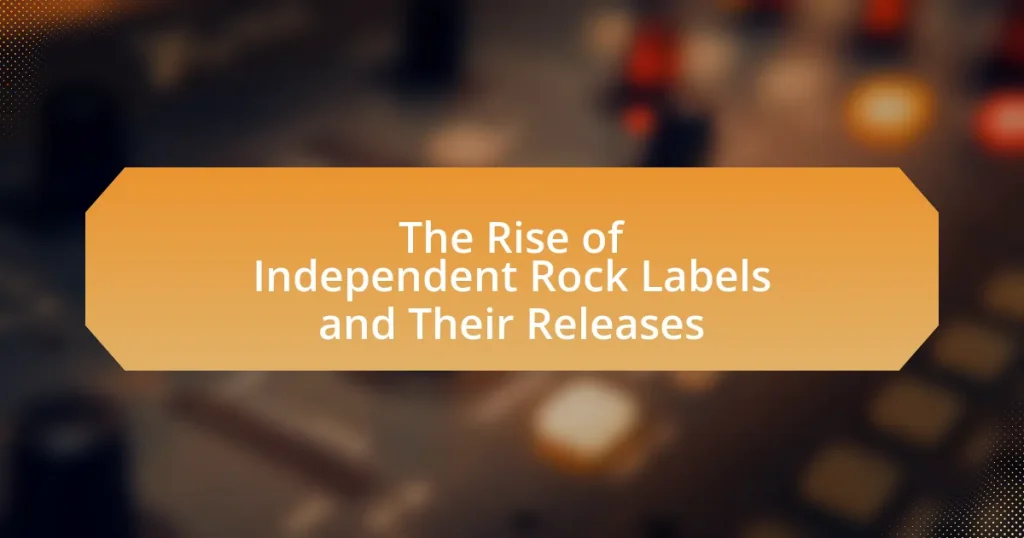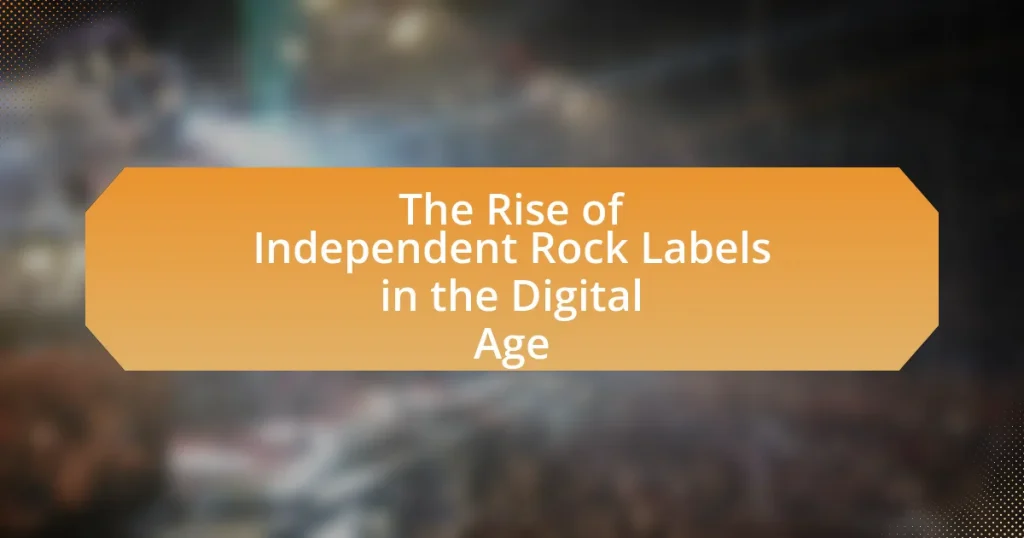Independent rock labels are music companies that operate independently of major record labels, emphasizing artistic freedom and niche market promotion. This article explores the characteristics, differences from major labels, and the significant role independent rock labels play in the music industry, particularly in supporting emerging artists and enhancing music diversity. It also examines the impact of technology and social media on their growth, notable releases, and the challenges they face in a competitive market. Additionally, the article highlights best practices for success, including effective marketing strategies and community engagement, which are essential for the sustainability of independent rock labels.

What are Independent Rock Labels?
Independent rock labels are music companies that operate without major record label affiliation, focusing on promoting and distributing rock music. These labels often prioritize artistic freedom and niche markets, allowing artists to maintain creative control over their work. Historically, independent rock labels gained prominence in the 1980s and 1990s, with notable examples including Sub Pop and Matador Records, which played crucial roles in the rise of alternative rock and grunge music. Their success is evidenced by the significant impact they have had on the music industry, fostering the careers of numerous influential artists and bands outside the mainstream commercial framework.
How do Independent Rock Labels differ from Major Labels?
Independent rock labels differ from major labels primarily in their operational structure, funding sources, and artist relationships. Independent labels typically operate with smaller budgets, allowing for more creative freedom and a focus on niche markets, while major labels have extensive financial resources and broader distribution networks, often prioritizing commercial success. For example, independent labels like Sub Pop and Matador Records have cultivated unique artist rosters and fostered close relationships with their musicians, emphasizing artistic integrity over mass appeal, contrasting with major labels like Universal Music Group, which often prioritize mainstream hits and large-scale marketing campaigns. This distinction highlights the varying approaches to artist development and market strategy within the music industry.
What are the key characteristics of Independent Rock Labels?
Independent rock labels are characterized by their artist-centric approach, creative freedom, and niche market focus. These labels prioritize the artistic vision of their musicians, allowing for greater experimentation and innovation in music production compared to major labels. They often operate with limited budgets, which fosters a DIY ethic and encourages grassroots marketing strategies. Additionally, independent rock labels typically have a strong connection to local music scenes, promoting regional artists and fostering community engagement. This model has been validated by the success of numerous independent labels, such as Sub Pop and Matador Records, which have launched the careers of influential bands while maintaining their unique identities.
Why do artists choose Independent Rock Labels over Major Labels?
Artists choose Independent Rock Labels over Major Labels primarily for greater creative control and a more personalized approach to their music. Independent labels typically offer artists the freedom to explore their sound without the commercial pressures often imposed by major labels, which prioritize marketability. For instance, a study by the Future of Music Coalition found that 70% of independent artists reported feeling more satisfied with their artistic freedom compared to those signed to major labels. Additionally, independent labels often provide a closer relationship with their artists, allowing for more direct communication and collaboration, which can lead to a more authentic representation of the artist’s vision.
What role do Independent Rock Labels play in the music industry?
Independent rock labels play a crucial role in the music industry by providing a platform for emerging artists to release their music outside of major label constraints. These labels often prioritize artistic freedom, allowing musicians to explore diverse sounds and styles without commercial pressures. For instance, independent labels like Sub Pop and Matador Records have been instrumental in launching the careers of influential bands such as Nirvana and Pavement, respectively. This support fosters innovation and diversity in the music landscape, contributing to the overall richness of the industry.
How do Independent Rock Labels support emerging artists?
Independent rock labels support emerging artists by providing them with resources, marketing, and distribution channels that are often inaccessible through major labels. These independent labels typically offer financial backing for recording, promote artists through various platforms, and help in building a fan base by organizing tours and live performances. For instance, according to a report by the Independent Music Companies Association, independent labels accounted for 39% of global music sales in 2020, demonstrating their significant role in the industry. This support structure allows emerging artists to maintain creative control while gaining exposure and developing their careers in a competitive market.
What impact do Independent Rock Labels have on music diversity?
Independent rock labels significantly enhance music diversity by promoting a wide range of genres and artists that may not receive attention from major labels. These labels often prioritize artistic freedom, allowing musicians to explore unique sounds and styles, which contributes to a richer musical landscape. For instance, independent labels like Sub Pop and Matador have been instrumental in launching the careers of diverse artists across genres such as grunge, indie pop, and experimental rock, thereby broadening the scope of what is considered mainstream music. This commitment to diversity is reflected in the variety of artists they sign, which often includes underrepresented voices and niche genres, fostering innovation and cultural expression within the music industry.

What factors contributed to the rise of Independent Rock Labels?
The rise of Independent Rock Labels was primarily driven by the desire for artistic freedom and the limitations imposed by major record labels. Independent labels offered musicians the opportunity to produce and distribute music without the constraints of commercial pressures, allowing for greater creative expression. This shift was further fueled by technological advancements, such as the advent of affordable recording equipment and the internet, which enabled artists to reach audiences directly. For instance, the 1990s saw a significant increase in the number of independent labels, with over 1,000 new labels emerging in the United States alone, reflecting a growing market for diverse musical styles outside mainstream channels.
How has technology influenced the growth of Independent Rock Labels?
Technology has significantly influenced the growth of Independent Rock Labels by enabling easier access to music production, distribution, and marketing. Digital audio workstations and affordable recording equipment have democratized music production, allowing independent artists to create high-quality recordings without the need for major label backing. Additionally, platforms like Bandcamp and SoundCloud have provided independent labels with direct access to global audiences, facilitating the distribution of music without traditional gatekeepers. According to a 2021 report by the International Federation of the Phonographic Industry, independent labels accounted for 40% of global recorded music revenue, highlighting their increasing market share driven by technological advancements.
What digital platforms have empowered Independent Rock Labels?
Digital platforms that have empowered Independent Rock Labels include Bandcamp, SoundCloud, and Spotify. Bandcamp allows artists to sell music directly to fans, providing a higher revenue share compared to traditional distribution methods. SoundCloud offers a platform for sharing and promoting music, enabling independent labels to reach wider audiences through user-generated content. Spotify, with its extensive user base, provides independent labels with access to streaming revenue and playlist placements, which can significantly increase visibility and listener engagement. These platforms collectively enhance the ability of independent rock labels to distribute their music, connect with fans, and generate income.
How has social media changed the landscape for Independent Rock Labels?
Social media has significantly transformed the landscape for independent rock labels by providing them with direct access to audiences and enabling cost-effective marketing strategies. Independent rock labels can now promote their artists through platforms like Instagram, Facebook, and Twitter, allowing for real-time engagement and feedback from fans. This shift has led to a democratization of music distribution, where labels can bypass traditional gatekeepers such as radio and major record labels. For instance, a study by MIDiA Research in 2020 indicated that independent labels saw a 35% increase in revenue attributed to social media marketing efforts. This evidence underscores the pivotal role social media plays in enhancing visibility and fostering community around independent rock music.
What cultural shifts have supported the rise of Independent Rock Labels?
The rise of Independent Rock Labels has been supported by cultural shifts such as the increasing value placed on artistic authenticity and the democratization of music production and distribution. As audiences have gravitated towards music that reflects personal and diverse experiences, independent labels have thrived by promoting unique sounds and niche genres that mainstream labels often overlook. Additionally, the advent of digital technology and social media has enabled independent artists to reach global audiences without the need for traditional record label support, exemplified by platforms like Bandcamp and SoundCloud. This shift has led to a significant increase in the number of independent releases, with statistics showing that independent labels accounted for over 40% of the U.S. music market share in recent years, highlighting their growing influence and the cultural demand for independent music.
How has the DIY ethic influenced the Independent Rock scene?
The DIY ethic has significantly influenced the Independent Rock scene by promoting self-sufficiency and artistic freedom among musicians. This approach encourages artists to produce, distribute, and promote their music independently, often leading to the establishment of independent labels that prioritize creative control over commercial success. For instance, the rise of bands like Fugazi and their commitment to DIY principles in the 1980s and 1990s exemplifies how this ethic allowed them to maintain artistic integrity while building a dedicated fan base. Additionally, the proliferation of home recording technology and online platforms has further empowered independent artists to reach audiences without relying on major record labels, reinforcing the DIY ethos as a cornerstone of the Independent Rock movement.
What role do music festivals play in promoting Independent Rock Labels?
Music festivals play a crucial role in promoting Independent Rock Labels by providing a platform for exposure and audience engagement. These festivals often feature a diverse lineup that includes emerging artists signed to independent labels, allowing them to reach larger audiences and gain visibility. For instance, events like Coachella and Lollapalooza have historically showcased independent acts, leading to increased sales and streaming numbers for these artists. Additionally, music festivals facilitate networking opportunities between independent labels, artists, and industry professionals, fostering collaborations that can enhance the labels’ market presence. This symbiotic relationship between festivals and independent labels ultimately contributes to the growth and sustainability of the independent music scene.

What are the notable releases from Independent Rock Labels?
Notable releases from independent rock labels include “In the Aeroplane Over the Sea” by Neutral Milk Hotel, released by Merge Records in 1998, and “Funeral” by Arcade Fire, released by Merge Records in 2004. These albums have received critical acclaim and have significantly influenced the indie rock genre. Additionally, “The Moon & Antarctica” by Modest Mouse, released by Epic Records in 2000, showcases the impact of independent labels on mainstream music. The success of these albums demonstrates the vital role independent rock labels play in promoting innovative music and artists.
Which Independent Rock Labels have made significant contributions to the genre?
Independent rock labels that have made significant contributions to the genre include Sub Pop, Matador Records, and Merge Records. Sub Pop, founded in 1986, played a crucial role in the grunge movement by signing bands like Nirvana and Soundgarden, which helped define the sound of the 1990s. Matador Records, established in 1989, has been influential in promoting alternative rock and indie music, with artists such as Pavement and Interpol in its roster. Merge Records, founded in 1989, is known for its support of indie rock bands like Arcade Fire and Neutral Milk Hotel, contributing to the genre’s growth and popularity. These labels have not only released critically acclaimed albums but have also shaped the landscape of independent rock music.
What are some landmark albums released by Independent Rock Labels?
Some landmark albums released by independent rock labels include “Nevermind” by Nirvana, released in 1991 on DGC Records, which played a crucial role in bringing grunge music to mainstream audiences. Another significant album is “The Moon & Antarctica” by Modest Mouse, released in 2000 on Epic Records, showcasing the band’s unique sound and lyrical depth. Additionally, “In the Aeroplane Over the Sea” by Neutral Milk Hotel, released in 1998 on Merge Records, has been influential in the indie rock genre, noted for its emotional resonance and innovative instrumentation. These albums exemplify the impact of independent labels in shaping the rock music landscape.
How do these releases reflect the ethos of Independent Rock Labels?
Releases from independent rock labels reflect their ethos by prioritizing artistic freedom and authenticity over commercial success. Independent labels often support diverse and unconventional sounds, allowing artists to explore their creativity without the constraints typically imposed by major labels. For instance, the rise of labels like Sub Pop and Matador in the late 1980s and early 1990s showcased a commitment to nurturing unique voices, as evidenced by the success of bands like Nirvana and Pavement, which thrived on their distinct styles rather than mainstream trends. This focus on genuine expression and community engagement further solidifies the identity of independent rock labels, emphasizing their role in fostering innovation within the music industry.
What trends can be observed in the releases from Independent Rock Labels?
Independent rock labels are increasingly focusing on diverse musical styles and innovative marketing strategies. This trend is evidenced by the rise of genre-blending releases, where independent artists experiment with elements from various genres, leading to a broader appeal. Additionally, independent labels are leveraging digital platforms for distribution, which has resulted in a significant increase in the number of releases; for instance, Bandcamp reported a 50% increase in independent music sales during 2020. Furthermore, collaborations between artists and labels are becoming more common, fostering a community-driven approach that enhances visibility and engagement. These trends highlight the adaptability and creativity of independent rock labels in a rapidly evolving music landscape.
How do genre-blending and experimentation manifest in these releases?
Genre-blending and experimentation in independent rock label releases manifest through the incorporation of diverse musical styles and innovative production techniques. Many artists under these labels combine elements from genres such as punk, folk, electronic, and hip-hop, creating unique soundscapes that challenge traditional rock conventions. For instance, the album “Everything Now” by Arcade Fire integrates disco and electronic influences, showcasing how independent labels encourage artists to explore beyond their primary genre. This trend is supported by the rise of platforms like Bandcamp, which allow artists to experiment freely without the constraints of major label expectations, leading to a more eclectic and varied music landscape.
What themes are prevalent in the music released by Independent Rock Labels?
Themes prevalent in the music released by Independent Rock Labels include authenticity, social commentary, and personal introspection. Independent rock artists often prioritize genuine expression over commercial appeal, leading to lyrics that reflect real-life experiences and emotions. For instance, many songs tackle issues such as mental health, political unrest, and identity struggles, resonating with listeners who seek relatable content. The DIY ethos of independent labels fosters a culture of experimentation, resulting in diverse sounds and lyrical themes that challenge mainstream norms. This focus on authenticity and social relevance is supported by the growing popularity of independent music, which has seen a significant increase in streaming and sales, indicating a strong audience connection to these themes.
What challenges do Independent Rock Labels face in the current market?
Independent rock labels face significant challenges in the current market, primarily due to competition from major labels and digital streaming platforms. The rise of streaming services has shifted revenue models, making it difficult for independent labels to secure fair compensation for their artists. According to a report by the International Federation of the Phonographic Industry (IFPI), independent labels accounted for only 30% of global recorded music revenue in 2022, highlighting their struggle against larger entities. Additionally, independent labels often lack the marketing budgets and resources that major labels possess, limiting their ability to promote their artists effectively. This competitive disadvantage is compounded by the oversaturation of the market, where numerous artists vie for attention, making it challenging for independent labels to stand out.
How do financial constraints affect the operations of Independent Rock Labels?
Financial constraints significantly limit the operational capabilities of Independent Rock Labels by restricting their ability to invest in artist development, marketing, and distribution. These labels often operate with limited budgets, which can lead to fewer resources for promoting new releases, resulting in reduced visibility in a competitive market. For instance, a study by the Music Industry Research Association found that independent labels typically allocate only 10-15% of their revenue to marketing, compared to major labels that can spend upwards of 30%. This financial limitation can hinder their capacity to sign new talent, produce high-quality recordings, and reach wider audiences, ultimately affecting their sustainability and growth in the music industry.
What strategies do Independent Rock Labels use to overcome competition?
Independent rock labels use several strategies to overcome competition, including niche marketing, artist development, and leveraging digital platforms. Niche marketing allows these labels to target specific audiences, creating a loyal fan base that larger labels may overlook. For instance, labels often focus on unique genres or local scenes, which helps them stand out in a crowded market.
Artist development is another critical strategy; independent labels invest time and resources in cultivating their artists’ careers, providing personalized support that larger labels may not offer. This approach can lead to stronger artist-label relationships and more authentic music, which resonates with fans.
Additionally, independent rock labels leverage digital platforms for distribution and promotion, utilizing social media and streaming services to reach wider audiences at lower costs. According to a 2021 report by the International Federation of the Phonographic Industry, independent labels accounted for 40% of global music sales, demonstrating their effective use of these strategies to compete with major labels.
What best practices can Independent Rock Labels adopt for success?
Independent rock labels can achieve success by focusing on artist development, effective marketing strategies, and building strong community connections. Artist development involves nurturing talent through mentorship and providing resources for creative growth, which has been shown to enhance long-term career sustainability. Effective marketing strategies, such as leveraging social media platforms and targeted digital advertising, can increase visibility and engagement, as evidenced by the success of independent labels that utilize these tools to reach wider audiences. Additionally, fostering community connections through local events and collaborations can create loyal fan bases, as seen in the practices of successful independent labels that prioritize grassroots engagement.
How can Independent Rock Labels effectively market their artists?
Independent rock labels can effectively market their artists by leveraging digital platforms, social media engagement, and targeted promotional strategies. Digital platforms such as Spotify and Bandcamp allow independent labels to distribute music widely and reach global audiences, with Spotify reporting over 400 million users as of 2023, providing a substantial market for new artists. Social media engagement, particularly on platforms like Instagram and TikTok, enables labels to create direct connections with fans, fostering community and increasing visibility; for instance, TikTok has been instrumental in launching viral music trends, significantly boosting artist exposure. Additionally, targeted promotional strategies, including collaborations with influencers and curated playlists, can enhance an artist’s reach and credibility, as evidenced by the success of independent artists who have gained traction through strategic partnerships and playlist placements.
What role does community engagement play in the success of Independent Rock Labels?
Community engagement is crucial for the success of Independent Rock Labels as it fosters a loyal fan base and enhances visibility. Engaging with local communities allows these labels to build strong relationships with artists and audiences, leading to increased support for releases and events. For instance, independent labels often host local shows and collaborate with community organizations, which not only promotes their artists but also strengthens their brand presence. According to a study by the Music Industry Research Association, labels that actively engage with their communities see a 30% increase in album sales compared to those that do not. This demonstrates that community involvement directly correlates with commercial success and sustainability in the independent music sector.



